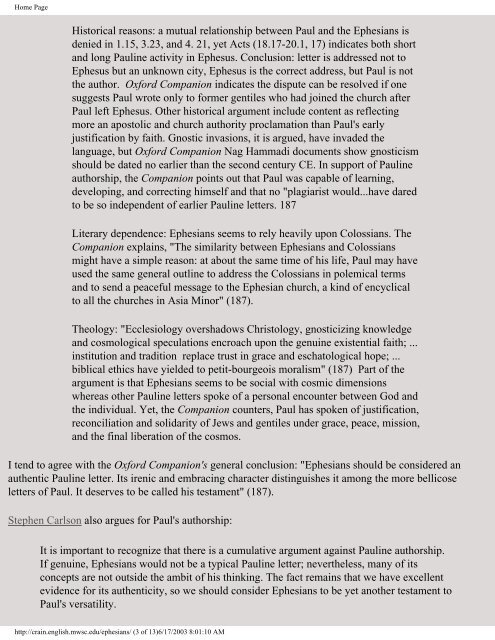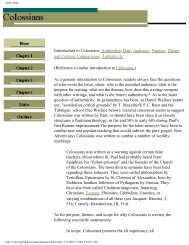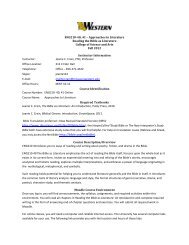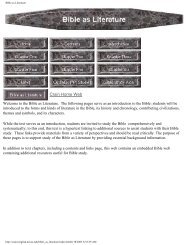Ephesians - Crain Home
Ephesians - Crain Home
Ephesians - Crain Home
Create successful ePaper yourself
Turn your PDF publications into a flip-book with our unique Google optimized e-Paper software.
<strong>Home</strong> Page<br />
Historical reasons: a mutual relationship between Paul and the <strong>Ephesians</strong> is<br />
denied in 1.15, 3.23, and 4. 21, yet Acts (18.17-20.1, 17) indicates both short<br />
and long Pauline activity in Ephesus. Conclusion: letter is addressed not to<br />
Ephesus but an unknown city, Ephesus is the correct address, but Paul is not<br />
the author. Oxford Companion indicates the dispute can be resolved if one<br />
suggests Paul wrote only to former gentiles who had joined the church after<br />
Paul left Ephesus. Other historical argument include content as reflecting<br />
more an apostolic and church authority proclamation than Paul's early<br />
justification by faith. Gnostic invasions, it is argued, have invaded the<br />
language, but Oxford Companion Nag Hammadi documents show gnosticism<br />
should be dated no earlier than the second century CE. In support of Pauline<br />
authorship, the Companion points out that Paul was capable of learning,<br />
developing, and correcting himself and that no "plagiarist would...have dared<br />
to be so independent of earlier Pauline letters. 187<br />
Literary dependence: <strong>Ephesians</strong> seems to rely heavily upon Colossians. The<br />
Companion explains, "The similarity between <strong>Ephesians</strong> and Colossians<br />
might have a simple reason: at about the same time of his life, Paul may have<br />
used the same general outline to address the Colossians in polemical terms<br />
and to send a peaceful message to the Ephesian church, a kind of encyclical<br />
to all the churches in Asia Minor" (187).<br />
Theology: "Ecclesiology overshadows Christology, gnosticizing knowledge<br />
and cosmological speculations encroach upon the genuine existential faith; ...<br />
institution and tradition replace trust in grace and eschatological hope; ...<br />
biblical ethics have yielded to petit-bourgeois moralism" (187) Part of the<br />
argument is that <strong>Ephesians</strong> seems to be social with cosmic dimensions<br />
whereas other Pauline letters spoke of a personal encounter between God and<br />
the individual. Yet, the Companion counters, Paul has spoken of justification,<br />
reconciliation and solidarity of Jews and gentiles under grace, peace, mission,<br />
and the final liberation of the cosmos.<br />
I tend to agree with the Oxford Companion's general conclusion: "<strong>Ephesians</strong> should be considered an<br />
authentic Pauline letter. Its irenic and embracing character distinguishes it among the more bellicose<br />
letters of Paul. It deserves to be called his testament" (187).<br />
Stephen Carlson also argues for Paul's authorship:<br />
It is important to recognize that there is a cumulative argument against Pauline authorship.<br />
If genuine, <strong>Ephesians</strong> would not be a typical Pauline letter; nevertheless, many of its<br />
concepts are not outside the ambit of his thinking. The fact remains that we have excellent<br />
evidence for its authenticity, so we should consider <strong>Ephesians</strong> to be yet another testament to<br />
Paul's versatility.<br />
http://crain.english.mwsc.edu/ephesians/ (3 of 13)6/17/2003 8:01:10 AM






![[38cb1273][0][sourcelist][1][0] - Crain Home](https://img.yumpu.com/2168350/1/190x245/38cb12730sourcelist10-crain-home.jpg?quality=85)